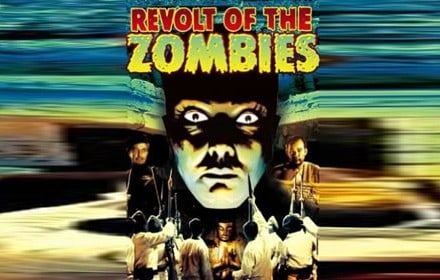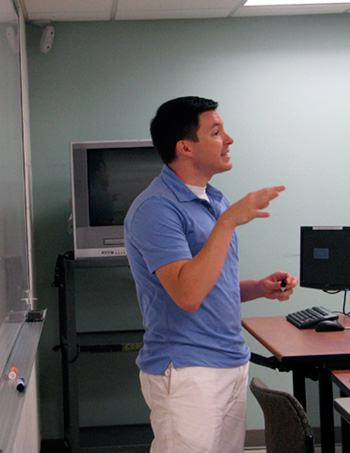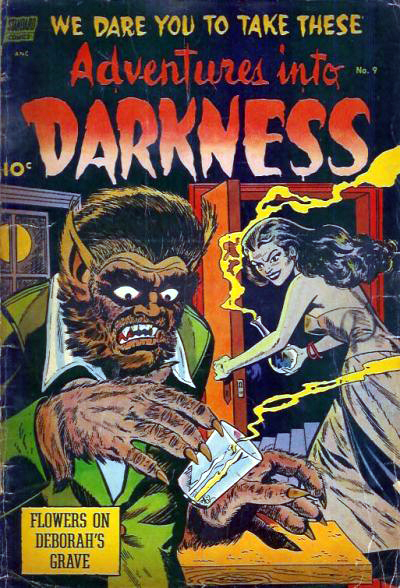Dr. DeLapp’s Students Sink their Teeth into Monster Lore

What counts as a “monster”? What makes something “monstrous”? What makes monsters scary and why? How is it that we can be ‘scared’ by depictions of monsters in movies and novels even while knowing cognitively that they’re fictional? These are some of the questions that students explored in Dr. Kevin DeLapp’s philosophy course, “Monsters and Monstrosities.”
As a monster lover himself, Dr. Kevin DeLapp, Fleming Associate Professor of Philosophy, found that the course was an opportunity to deepen his appreciation of the monster genre by subjecting it to philosophical analysis. He says, “As a philosopher, it was rewarding to translate otherwise abstract theories into something more culturally familiar that people can sink their teeth into…or that could sink its teeth into us!”
 Why monsters?
Why monsters?
For Dr. DeLapp, exploring our ideas about monsters can help us grapple with many deep philosophical issues. He says, “We discussed a number of monsters that populate literary studies (such as Frankenstein’s creature), but our approach differed from a purely literary one in that we focused more on conceptual questions of what makes something a ‘monster’ in the first place. The basic reason to care about the philosophical study of monsters is that, not only have they populated philosophical writings since the ancient world (for instance, Plato analyzes human moral psychology explicitly as a kind of ‘monster’), but also a culture’s fascination with particular monsters can be an informative mirror into that culture’s sense of its own identity.”
“A culture’s fascination with particular monsters can be an informative mirror into that culture’s sense of its own identity.”
He continues, “monsters are often depicted as hybrids of multiple different creatures (think of the centaurs or medusa from classical Hellenic mythology) or as existing between different states (vampires are both and neither dead and alive; cyborgs are both and neither human and machine). What do these ideas tell us about the conceptual categories we use to organize our world, and our notions of what counts as ‘natural’ or ‘unnatural’?
“‘Monster’ is also frequently used in various moral senses. For instance, we talk about ‘monstrous acts’ or mass killers as being ‘monsters.’ What is the function of this sort of language? What are we trying to explain when we call something ‘monstrous’? Studying monsters provided us with a lens for examining many of the questions that have engaged philosophers for centuries.”
Students say monsters make great teachers
Student Allison Moseley ’14 enrolled in the class because “I absolutely love monsters and horror movies–my friends call me a horror movie aficionado. I thought it would be interesting to look at monsters and monstrosities from a philosophical perspective since philosophy is one of my three majors.” Philosophy minor Paris McAllister ’13 chose the class because “Our culture is slightly obsessed with monsters, but we avoid talking about them intellectually.”
 The course encouraged students to think about monsters on an intellectual level. Paris said, “I really enjoyed how we analyzed the reasons that our society might have created a particular monster. For example, in the 17th and 18th centuries, Livonians were considered monsters (werewolves) because the Germans spread a rumor they were. Now the Germans wanted political control over Livonia so making them to be some sort of “beast” allowed the Germans to gain control over them by making them dangerous or the enemy.”
The course encouraged students to think about monsters on an intellectual level. Paris said, “I really enjoyed how we analyzed the reasons that our society might have created a particular monster. For example, in the 17th and 18th centuries, Livonians were considered monsters (werewolves) because the Germans spread a rumor they were. Now the Germans wanted political control over Livonia so making them to be some sort of “beast” allowed the Germans to gain control over them by making them dangerous or the enemy.”
Allison enjoyed class discussions about vampires. “I enjoyed this discussion because Dr. DeLapp brought up ways in which I had never thought about vampires before. I never thought about viewing vampires psychoanalytically as representations of our incestuous Freudian desires (with their oral fixations and needs for sensual closeness). It was also interesting to look at vampires as representing a moral obligation for humans to be vegetarians. Since we expect vampires to choose animal blood over killing humans, humans should choose the lesser of two evils by eating vegetables instead of animals.”
Students wrote a final paper exploring a topic related to the study of monsters in more depth. Allison focused on a monster which was not covered in class, the mummy. She said, “I chose this monster because it can be viewed psychoanalytically (a too tightly wrapped “mommy”) and it can be viewed as symbolizing an idea that our culture is obsessed with, aging and death. For ancient Egyptians, mummies were a way to preserve individuals. We do the same thing in America by trying to preserve our youth and youthful appearances.”
“Monsters have more to say about humans than humans have to say about monsters.”
Allison concluded that the course was a valuable part of her learning. She said, “To someone who asked what monsters have to do with philosophy, I would respond ‘Everything!’ Aside from monstrous births and pathological monsters, humans are responsible for the creation of monsters. Monsters, or what we find particularly scary, are specific and unique to a culture. By philosophizing about monsters and what we find scary, we learn more about ourselves as humans and become more important than the monsters themselves. Monsters have more to say about humans than humans have to say about monsters.”